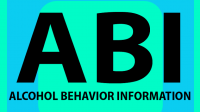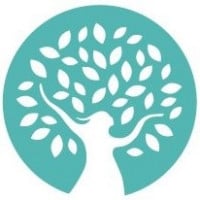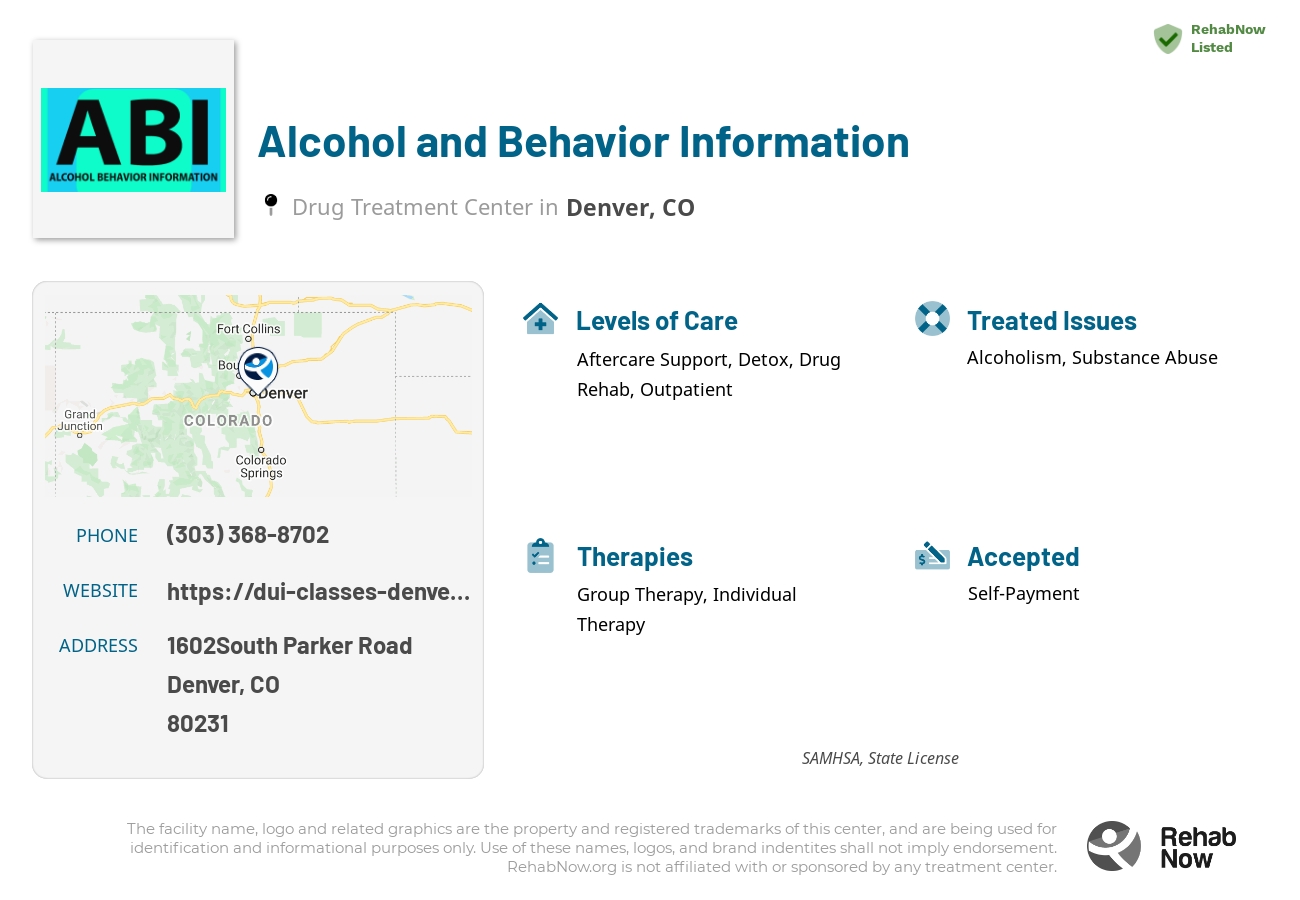
Alcohol and Behavior Information
Drug Rehab Center in Denver, Colorado
- Substance Abuse
- Drug Addiction
- Alcoholism
Alcohol and Behavior Information (ABI) is an outpatient substance abuse treatment program in Denver, Colorado, committed to providing evidenced-based treatment for those affected by substance abuse in a safe and encouraging environment with a staff of professionals including social workers, counselors and therapists dedicated to empowering individuals and families on their journey of recovery.
About This Colorado Facility
Alcohol and Behavior Information (ABI) is a private rehab facility located in Denver, Colorado, specializing in the treatment of substance abuse problems. With a team of dedicated professionals, including social workers, counselors, and therapists, ABI is committed to providing evidence-based treatment in a safe and supportive environment.
• Comprehensive individual and group counseling sessions utilizing Cognitive Behavioral Therapy
• Specialized recovery programs tailored to each client's unique needs
• Relapse prevention and aftercare services to ensure long-term success
• Family counseling and legal advocacy to support the entire family unit
ABI is accredited by CARF International and the American Society for Addiction Medicine, demonstrating their commitment to excellence in addiction recovery. They are also a member of the National Association of Addiction Treatment Providers.
The facility offers a range of services to help individuals overcome substance abuse, including psychological evaluations, recreational activities, and community involvement. By encouraging a holistic approach to recovery, ABI aims to empower individuals and families on their journey towards a healthier, substance-free life.
Genders
Ages
Modality
Additional
Accreditations
State License
SAMHSA
Conditions and Issues Treated
A drug abuser needs help because if no one helps them, they will not leave their vicious circle.
People who abuse drugs are likely to suffer from an addiction, which can cause serious health problems. It can also cause quarrels with people around them. It is common for drug abusers to have difficulty holding down jobs or relationships, but sometimes people around them can be quite tolerant. There are cases where the families of the drug abusers do not want to see them get any help, and the subject becomes controversial.
When it comes to helping drug abusers get sober, there are many options to choose from. It is essential to state that there is no “correct” way of doing things. People are different, and they need different types of help to get over their addiction.
Levels of Care Offered at Alcohol and Behavior Information
This center offers a variety of custom treatment tailored to individual recovery. Currently available are Aftercare Support, Detox, Drug Rehab, Outpatient, with additional therapies available as listed below.
Detoxification is the first step in drug addiction treatment. A controlled environment where symptoms can be managed with medication and close observation is provided by drug detoxification. Detoxification is an essential step in the recovery process, but it is also one of the most dangerous. Due to the potential danger, it’s critical to understand what detoxification is and how to complete it safely.
A detox program helps the person physically withdraw from drugs and helps them track their progress. So, suppose the person isn’t ready for sobriety (or relapses). In that case, the treatment professionals can catch it early and help re-orient them towards recovery.
Individuals struggling with drug addictions can get help from several treatment options, including inpatient and outpatient programs. Outpatient drug treatment programs can also provide patients with different levels of care, usually depending on the patient’s degree of addiction.
At an outpatient program in Denver, a patient will attend a recovery program during the day and return home in the evening. Suppose a patient is struggling with drug addiction. In that case, an outpatient program can serve as an effective transition point during the recovery process.
Aftercare is a part of drug rehabilitation. It is also known as “post-treatment support.” Aftercare programs are available for addicts after they complete drug rehab. It is often the final step in the recovery process. The goal of aftercare is to ensure that addicts maintain their achievements in rehab and do not relapse. Professionals generally provide aftercare (including addiction therapists, physicians, social workers, psychologists) and involve individual and group therapy sessions.
Therapies & Programs
Individual therapy is a critical component of addiction recovery. It allows the patients to go deep into their core issues and discover how to handle those problems better. Therapy can be conducted in individual sessions as well as group settings. In individual therapy for addiction, the patient meets with their therapist one-on-one to focus on the underlying issues. This allows patients to open up and discuss personal topics they may not feel comfortable discussing in a group setting. This type of therapy can help develop solutions specific to each patient, which helps speed up the recovery process.
Group therapy helps prevent addicts from feeling isolated or unique in their situation by offering a sense of comfort and fellowship. It also creates a forum for addicts to build their support systems and learn from each other. The group therapy sessions at Alcohol and Behavior Information occur in a group setting rather than one-on-one to create a safer, controlled environment where addicts feel comfortable.
Cognitive Behavioral Therapy (CBT) is a common therapeutic approach to help drug addicts. It teaches addicts new ways of thinking and behaving so that they can avoid relapse. There are several forms of CBT used in drug rehabilitation centers.
Cognitive Restructuring helps addicts identify faulty, negative thinking so that they can work together with the therapist to find healthier ways of thinking, resulting in better decision-making.
Cognitive Behavioral Therapy for Addiction uses the principles of CBT to help treat addiction. It focuses on specific aspects of each person’s thinking, feeling, physiology, and behavior. It aims to identify specific problems in these areas and create a personalized treatment strategy.
Payment Options Accepted
For specific insurance or payment methods please contact us.
Additional Details
Specifics, location, and helpful extra information.
Denver, Colorado 80231 Phone Number(303) 368-8702 Meta DetailsUpdated April 15, 2024
Staff Verified
Patient Reviews
There are no reviews yet. Be the first one to write one.
Denver, Colorado Addiction Information
The Centennial State has slipped to a ranking of 12th in the country for drug abuse. Each year around 24% of the state's population uses illegal drugs while nearly 5% of its population abuses alcohol. Substance-related deaths in Colorado were responsible for 15.12% between 2008 and 2017. Fortunately, Colorado drug and alcohol addiction treatment are available to help a person overcome addiction.
Drug addiction in Denver, Colorado, is quite serious. In 2012, there were 974 drug overdose fatalities in the area, which has likely only gone up in recent years. The city has an estimated 34,000 marijuana users reporting past-month usage in 2016. The most common drugs abused are methamphetamine, heroin, and marijuana. Some popular treatment options include inpatient rehab, outpatient rehab, and detoxification programs.
Treatment in Nearby Cities
- Windsor, CO (54.7 mi.)
- Johnstown, CO (44.9 mi.)
- Buena Vista, CO (88.7 mi.)
- Wheat Ridge, CO (11.5 mi.)
- Rifle, CO (154.7 mi.)
Centers near Alcohol and Behavior Information



The facility name, logo and brand are the property and registered trademarks of Alcohol and Behavior Information, and are being used for identification and informational purposes only. Use of these names, logos and brands shall not imply endorsement. RehabNow.org is not affiliated with or sponsored by Alcohol and Behavior Information.





